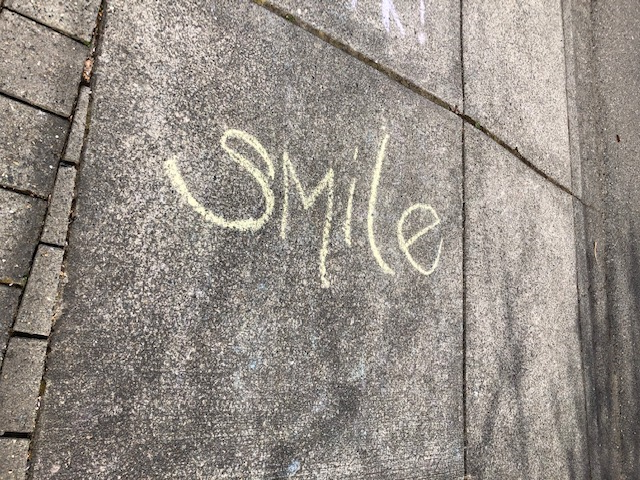
Can anything good come from Nazareth? A COVID-19 report from Kirkland, Washington
Rev. Bryan D. Jackson
March 24, 2020
Kirkland, Washington, is a nice place. It’s a nice community for a walk. And, I imagine, it’s as good a place as any, for the unexpected to strike. We bore the unfortunate burden of having the first COVID-19 fatalities in the United States. We are trying to make a comeback.
My wife and I live catty-corner to Mark Twain Elementary School in Kirkland. We are used to hearing the school bell throughout the day. Now it is silent. I miss the shrieks of the children; their arguments and flirtations. I’m a children’s fiction writer, after all, and I need those kids back for inspiration.
Yet, I hear children playing … no, wait! I see them playing—with one another! What I’m used to seeing, exclusive to the Mark Twain students during school hours, are streets and yards mostly devoid of children, and when I do see them, they invariably have their heads down, studiously scrolling through their phone apps or texts, sometimes rudely expecting their elders to move aside as they breeze past. As a former police officer, I can say that this lack of awareness of surroundings by children can be a recipe for the dark side. Is something unexpected, something positive, emerging from this social misery we call “the coronavirus?” Are we giving birth to something? The sounds of young people in frolic; yes, that’s a nice start.
Philip was excited. He told Nathanael, essentially, “Hey, we found the guy everyone’s been talking about; the one Moses wrote of.” (John 1:45 NIV). He had hoped Nathanael would share his jubilation. But Nathanael’s response expressed anxiety, maybe even fatigue: “Nazareth! Can anything good come from there?” (John 1:46 NIV) It’s a fair question, the kind we are likely to ask when stressed—exhausted. You can bet that our Kirkland first responders and other frontline folks are feeling that exhaustion already. I ask you to pray for them and for those in your own community.
Though Gov. Inslee is now calling for stricter social distancing—even amongst children, I still observe some little ones walking in chatty, gregarious small groups of two or three and even saying “Excuse me, please” and “Hello!” as they cruise by on their bikes at a safe distance. Picture ventriloquist Jeff Dunham’s “Walter” character, the grumpy old curmudgeon: well, that’s me when it comes to rude kids. I was raised to say things like “please” and “thank you.” I never thought those were high expectations for today’s kids. For some reason, I’ve seen so much more of this wonderful behavior since this crisis began. What is going on? Watching children investigate their surroundings with interest and glee is a throwback to my own childhood, when the only social media we had was actually playing with the kids next door and down the street. Perhaps crisis brings out the best in children. Or maybe this grumpy old man is noticing something that was always there.
Can anything good come out of Nazareth? You bet.
It isn’t just the children. I see more adults sitting on their front porches now, a result of the mandated social distancing. They wave or speak. People continue checking on their neighbors, volunteering to retrieve groceries or medicine. I saw more of this behavior as a matter of course in the southeast, where I was raised. Washingtonians are a bit more reserved, yet, interestingly, during the enforcement of this social distancing, some are embracing the concept of a healthy togetherness. Go figure.
I see more adults sitting on their front porches now, a result of the mandated social distancing. They wave or speak. People continue checking on their neighbors, volunteering to retrieve groceries or medicine. During the enforcement of this social distancing, some are embracing the concept of a healthy togetherness.
It is not lost on me that many of my colleagues will likely be preaching to virtual audiences this Easter. The thought of this is surreal. Like, the “What-if-I-gave-a-sermon-and-nobody-came?” nightmare some of us have had. But this is different, isn’t it? Because people will be there. You might be speaking to empty pews, but the souls of the saints will be there whether you have live-streaming capability or not. We will be there because, like Nathanael, we still have our questions. Yet, unlike Nathanael, we have a new covenant that assures us that a light exists that far exceeds in brilliance and grace any doubts we may have about viruses, politicians, media hype, or our future. It is rooted in the resurrection.
I will be the first to tell you that I am concerned and not just about family and friends. I am concerned about my civil rights, the Constitution that, on more than one occasion, I swore to “support, maintain and defend,” and my fellow Americans’ awareness of what is happening around them. Like everyone, I try to find ways to manage my anxiety. All I can really do right now, in this atmosphere of constant change, is breathe in, breathe out, and remember that we have a choice to be self-defining. We can thoughtfully choose, at least for now, how we will respond to each step of this pandemic.
I can also be on the lookout for those voices of laughter and know that, although the bell has gone silent for now, something good will always come out of Nazareth. Though I might have to step out for a brief stroll to find it, it all depends on how I look for it.
The Rev. Bryan D. Jackson is an American Baptist minister and a member of the Mount Hood Cherokees, a satellite community of the Cherokee Nation. He lives in Kirkland, Washington and is the author of Chattahoochee Rain: A Cherokee novella.
The views expressed are those of the author and not necessarily those of American Baptist Home Mission Societies.


